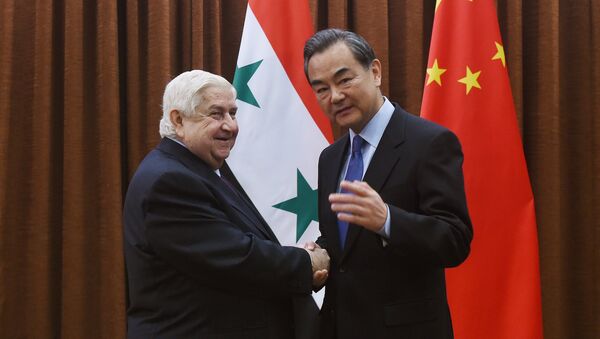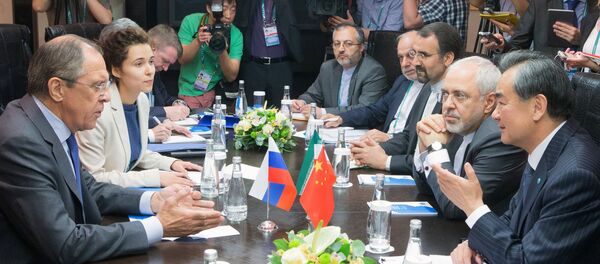"On December 24, China's Foreign Minister Wang Yi hosted his Syrian counterpart Walid al-Moallem in Beijing. Shortly thereafter Khaled Khoja, the president of the National Coalition for Syrian Revolutionary and Opposition Forces, arrived on January 5 for a multi-day visit," Rudolf writes in his piece for TheDiplomat.com.
"It is a novelty for Beijing to be so diplomatically active in the Middle East… Beijing had never before gone beyond making rhetorical calls for a peaceful solution, explaining its reluctance to engage out of respect for Syria's sovereignty," the analyst adds.
Chinese FM meets #Syrian opposition leader #China #Syria https://t.co/44un0TXysj pic.twitter.com/64gUuIKKHd
— Syria Today (@todayinsyria) 7 января 2016
First and foremost, though Syria itself is "mostly irrelevant as a trading partner" for Beijing, the region's stability does matter for the Chinese leadership: the ongoing crisis threatens the China-led $900-billion New Silk Road infrastructural project, which is supposed to connect Asia, the Middle East, Africa, and Europe.
On the other hand, Beijing fears that Daesh (Islamic State/ISIL) could reach China. In early December 2015 Daesh released a propaganda video in Mandarin Chinese urging Chinese Muslims to "wake up" and join the jihad.
Previously, the terrorist organization made repeated attempts to recruit Turkic-speaking Uyghurs, a Sunni Muslim minority which lives in China's far-west Uyghur Autonomous Region. In contrast, the latest effort has targeted the Mandarin-speaking Hui ethnic group, the largest group practicing Islam in the country, Christopher Harress, the defense reporter for International Business Times, wrote in his December piece.
"According to official sources in Beijing, there were numerous terrorist attacks in China with an Islamist background in 2014 and 2015. A strict new Chinese counterterrorism law, which came into force this year, underscores the leadership's terrorism fears," Rudolf elaborates.
China's policymakers view the Syrian peace process as an opportunity for Beijing to broaden its experience in dealing with multilateral global crisis management and conflict mediation, the Berlin-based analyst suggests.
The ability to "shape resolutions" in multilateral negotiations will allow Beijing to gain the status of a global power.
"In pursuit of this vision, Chinese diplomats are now involved in more international negotiations than ever before," Rudolf emphasizes, referring to Beijing's recent diplomatic efforts in Afghanistan, Iran and Saudi Arabia.
"The international community should identify an increasing number of appropriate channels to include China in managing global security," the analyst underscores, expressing concerns over Beijing's ability to foster parallel security structures.





